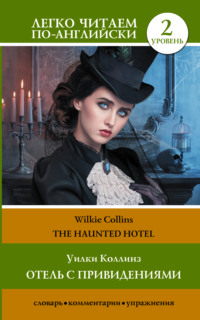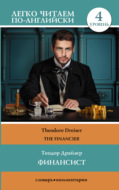Kitobni o'qish: «The Haunted Hotel / Отель с привидениями»
© Матвеев С.А., адаптация текста, комментарии, словарь и упражнения
© ООО «Издательство АСТ», 2022
Wilkie Collins
The Haunted Hotel. A Mystery of Modern Venice
The First Part
Chapter I
In the year 1860, the reputation of Doctor Wybrow as a London physician reached its highest point. It was reported that he was one of the richest doctors in modern times.
One afternoon, the Doctor had just taken his luncheon in his consulting-room, and was sitting with a formidable list of visits to patients – when the servant announced that a lady wished to speak to him.
‘Who is she?’ the Doctor asked. ‘A stranger?’
‘Yes, sir.’
‘I see no strangers out ofconsulting-hours1. Tell her what the hours are, and send her away.’
‘I have told her, sir.’
‘Well?’
‘And she won’t go.’
‘Won’t go?’ The Doctor smiled as he repeated the words. The situation rather amused him. ‘Has this obstinate lady given you her name?’ he inquired.
‘No, sir. She refused to give any name –she said she wouldn’t keep you five minutes2, and the matter was too important to wait till tomorrow. There she is in the consulting-room; and I don’t know how to get her out.’
Doctor Wybrow considered for a moment. He had met with women in all their varieties – especially the variety which knows nothing of the value of time. A glance at his watch informed him that he must soon begin hisrounds among the patients3 who were waiting for him at their own houses. So he decided to escape.
‘Is the carriage at the door?’ he asked.
‘Yes, sir.’
‘Very well. Open the house-door for me without any noise, and leave the lady in the consulting-room. When she gets tired, you know what to tell her. If she asks when I will return, say that I dine at my club, and spend the evening at the theatre. And softly, Thomas! If your shoes creak, I am a lost man.’
He noiselessly led the way into the hall, followed by the servanton tip-toe4.
Did the lady in the consulting-room suspect him? Or did Thomas’s shoes creak? Was her sense of hearing unusually keen? Exactly as Doctor Wybrow passed his consulting-room, the door opened – the lady appeared on the threshold – and laid her hand on his arm.
‘I entreat you, sir, not to go away. Let me speak to you first.’
The accent was foreign; the tone was low and firm. Her fingers closed gently, and yet resolutely, on the Doctor’s arm.
Neither her language nor her action had the slightest effect. The influence that instantly stopped him, on the way to his carriage, was the silent influence of her face. The contrast between the pallor of her complexion and the glittering metallic brightness in her large black eyes held him literally spellbound. She was dressed in dark colours, with perfect taste; she was of middle height, and (apparently) of middle age – a year or two over thirty. Her nose, mouth, and chin possessed the fineness and delicacy of form. She was unquestionably a handsome person. She produced in the Doctor an overpowering feeling of professional curiosity. The case might be something entirely new in his professional experience.
She perceived that she had produced a strong impression upon him, and dropped her hold on his arm.
‘You have comforted many miserable women ‘ she said. ‘Comfort one more, today.’
And she led the way back into the room.
The Doctor followed her, and closed the door. He placed her in the patients’ chair, opposite the windows. Even in London the sun, on that summer afternoon, was dazzlingly bright. The radiant light flowed in on her. Her eyes met it unflinchingly. The smooth pallor of her unwrinkled skin looked more fearfully white than ever.
She had, strangely enough, nothing to say to him. A curious apathy took possession of this woman. The Doctor merely inquired what he could do for her.
She said abruptly: ‘I have a painful question to ask.’
‘What is it?’
Her eyes travelled slowly from the window to the Doctor’s face.
‘I want to know, if you please, am I going mad?’
Doctor Wybrow was disappointed. Was the new patient only a hypochondriacal woman, whose malady was a disordered stomach and whose misfortune was a weak brain?
‘Why do you come to me?’ he asked sharply. ‘Why don’t you consult a psychiatrist?’
‘I don’t go to a psychiatrist,’ she said, ‘I come to you, because my case is outside of all lines and rules, and because you are famous in your profession for the discovery of mysteries in disease. Are you satisfied?’
He was more than satisfied. She was correctly informed as to his professional position.
‘I am at your disposal,’ he answered. ‘Let me try if I can find out what is the matter with you.’
He put his medical questions. She answered promptly and plainly. The strange lady was, mentally and physically, in excellent health. Not satisfied with questions, he carefully examined the great organs of life. Neither his hand nor his stethoscope could discover anything wrong.
‘I can find nothing the matter with you,’ he said. ‘I can’t even explain the extraordinary pallor of your complexion. You completely puzzle me.’
Bepul matn qismi tugad.








